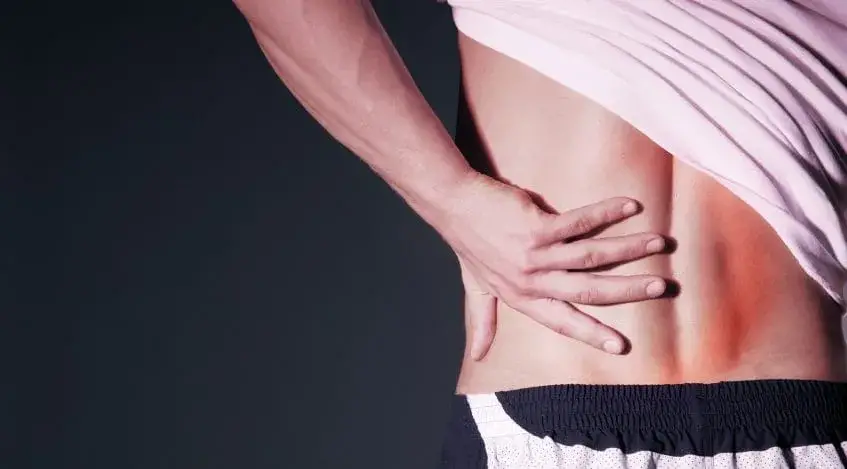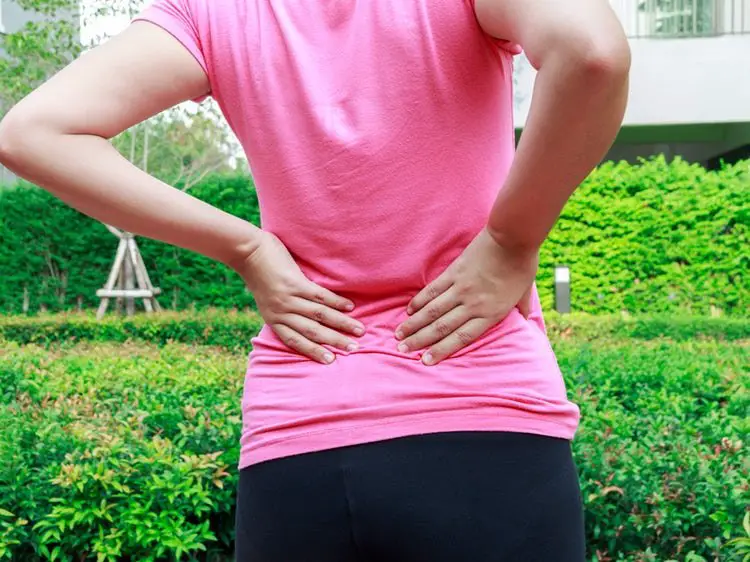What Is Lower Back Pain
Low back pain can result from many different injuries, conditions or diseases most often, an injury to muscles or tendons in the back.
Pain can range from mild to severe. In some cases, pain can make it difficult or impossible to walk, sleep, work or do everyday activities.
Usually, lower back pain gets better with rest, pain relievers and physical therapy . Cortisone injections and hands-on treatments can relieve pain and help the healing process. Some back injuries and conditions require surgical repair.
Why Does My Back Hurt When I Walk
The spine fulfills two important roles in how the body works: its flexible to allow a wide range of movement, but its also the central support column that holds up the body. This means that it can be subjected to a significant amount of strain from daily activities, with some actions being more stressful than others.
Your spine is also the main pathway of your nervous system, so any pain around your back can be significantly more painful than other parts of your body. And since your spine acts as your bodys primary support, any pain or discomfort it experiences can start a cascade of problems.
Additional weight, poor posture, and lifestyle habits are some primary reasons patients develop back pain. These factors put significant stress on your spine in areas where its not built to handle it, which results in acute back pain when you walk. Even your general health affects how your lower back can hold up to pressure: osteoporosis, smoking, and diabetes are all health conditions that can affect your spine.
Another factor to consider is your sleeping position. Because your spine is built to flex and it follows a normal curvature the wrong sleeping position can cause your joints to freeze or twist unnaturally. If you experience a lot of back pain after waking up, your sleeping position may be the cause.
When To Call The Doctor
Most back pain gets better after a few weeks. But you should call the doctor if:
- Your pain is constant or intense, especially at night or when you lie down.
- Your pain spreads down one or both legs.
- You feel numbness or tingling in one or both legs.
- Youâre losing weight without trying.
Go to the emergency room right away if you have any of these symptoms:
- Pain after a fall, car crash or sports injury
- Trouble controlling your bowels or bladder
Show Sources
Also Check: Does Epsom Salt Help Back Pain
Following Up With Your Doctor
After making treatment recommendations, a doctor will typically ask to see you again in 6 to 12 weeks. In the interim, if your chronic back pain symptoms do not improve or even get worse with treatment, you can contact your doctors office and ask about adjusting the treatment plan.
For example, if you have been diagnosed with chronic lower back pain caused by degenerative disc disease, you may be prescribed a muscle relaxant or advised to take an over-the-counter pain reliever. If you find the recommended medication causes side effects that you cant tolerate, your doctor can recommend alternatives.
When You Should Go To The Er For Back Pain

If your back pain is accompanied by any of the following symptoms, head to your closest emergency room because you could be dealing with a more serious condition or injury:
- Sudden spike in pain, discomfort, weakness or numbness
- Loss of bladder function
- Unexplainable weight loss
- The pain results from a fall or severe blow to your back
If you experience any of these symptoms, its a good idea to talk to your doctor so you can determine next steps for managing pain.
Also Check: Can Obesity Cause Back Pain
Complete Guide To Low Back Pain
This article might ease your mind, but what about your back pain? If your pain is becoming chronic , or if you just keep having flare-ups, you may want to dive much deeper into the topic. There arent any easy answers for stubborn back pain, but there is evidence-based hope, and the PainScience.com back pain tutorial explores the topic extremely thoroughly. The main text is written for patients, but its also extensively referenced for keen readers and healthcare professionals.
Sensations That Might Indicate A Medical Emergency
1. Sharp pain rather than a dull ache: This could indicate a torn muscle or ligament, or a problem with an internal organ in the back or side.2. Radiating pain: This pain “moves” or shoots to the glutes or legs, which could indicate a nerve compression condition.
3. Sudden weakness in the legs: Limb weakness can be caused by compressed nerves in the spine due to conditions like sciatica or spinal stenosis. However, sudden leg weakness could also indicate a stroke.4. Incontinence: Back pain paired with inability to control the bowels or bladder might be a sign of serious nerve compression or a spine infection, such as discitis or meningitis.5. Numbness or pins and needles in the groin or glutes: This is known as saddle anesthesia and is also a sign of a serious nerve or spine condition.
If you have leg weakness, incontinence, and numbness together, you might have cauda equina syndrome, a serious illness characterized by spinal cord nerve damage. This is a medical emergency, and patients usually need surgery immediately to decompress the nerves and reduce permanent damage.
Related reading: Get help for back, neck, and leg pain caused by spinal stenosis
Also Check: What To Do For Back Pain During Pregnancy
How Soon Will I Feel Better
Depending on how severe your original muscle strain is, you should feel better in a few weeks. Talk to your healthcare provider before resuming any intense physical activities.
If you start working out or playing sports again before your muscle is healed, youre at an increased risk of re-injuring it and hurting your muscle worse than the original strain.
Dont Miss: How To Cure Your Back Pain
When To See A Doctor
Even though it’s common, most cases of back pain tend to clear up without the need to see a doctor.
You should see your doctor if your pain:
- is really bad
- lasts for a long time
- stops you from working or doing the things you enjoy
- affects your everyday activities
- gets worse.
You should also see your doctor if you have any changes in sexual function, for example, being unable to get an erection.
If the pain is causing you significant problems and stops you from getting on with normal life and work activities, your doctor will examine you and ask you questions.
These questions will help predict how likely it is that you need further help with your back pain. If you do need further support, your doctor will make a referral to physiotherapy so that you can have treatment early, to help with the pain and return to normal activities.
Its natural to want to know what has caused your back pain. However, specialists may not be able to tell you for certain what has caused your back pain, even after carefully assessing you.
If youre concerned about the cause of your back pain, it can help to talk openly about any worries with a healthcare professional, as reducing any fear may help speed up your recovery.
You May Like: Can Lower Back Pain Cause Groin Pain
Low Back Pain Symptoms
Low back pain symptoms vary greatly from person to person. They are different depending upon the cause of the pain. Your pain may be dull or sharp. It may come and go. And depending upon its source, pain may get worse with standing, sitting, bending, or walking. Pain can even extend into your buttock or leg. Along with this shooting pain may come feelings of numbness, tingling, or weakness down your leg. Called sciatica, these symptoms may be a common result of a herniated disk in the lower back, where the disk bulges out toward the spinal canal.
Overuse And Repetition Of Everyday Activities
Every day, the little things we do can have a big impact on the amount of stress we put on our bodies. Examples include:
- Driving or sitting for long periods of time
- Repetitive motion activities such as walking, bending over, exercising or typing
- Lifting both small and heavy objects
- Sleeping in an odd position or on an old mattress
Don’t Miss: Can Lower Back Pain Cause Neck Pain And Headaches
Possible Causes Of Pain When Standing
In some cases, your pain may be caused by a strain, a sprain, or simple muscle fatigue. If the pain has appeared after overexertion, an accident, or a sports injury, you may have stretched or twisted a tendon or ligament . Other causes of pain while standing include:
- Spinal stenosis a narrowing of the spinal column that puts pressure on spinal nerves
- Hyperlordosis curvature of the lower spine
- Herniated disc when part of a disc that acts as a cushion between two vertebrae, slips out of place, possibly compressing a nerve
- Spondylolisthesis when a lumbar vertebra slips forward onto the bone beneath it
- Neuropathy damage to peripheral nerves that may cause weakness, numbness, tingling, or pain in the hands and feet
- Osteoarthritis damage to joints of the spine, known as facet joints, usually as a result of aging
- Pinched nerves resulting from pressure from bones, cartilage, muscles, or tendons
- Sciatica pressure on the sciatic nerve that causes pain in the hips, buttocks, and legs
Causes Of Chronic Lower Back Pain

Pain is considered chronic once it lasts for more than three months and exceeds the bodys natural healing process. Chronic pain in the low back often involves a disc problem, a joint problem, and/or an irritated nerve root. Common causes include:
Lumbar herniated disc. The jelly-like center of a lumbar disc can break through the tough outer layer and irritate a nearby nerve root. The herniated portion of the disc is full of proteins that cause inflammation when they reach a nerve root, and inflammation, as well as nerve compression, cause nerve root pain. The disc wall is also richly supplied by nerve fibers, and a tear through the wall can cause severe pain.
Degenerative disc disease. At birth, intervertebral discs are full of water and at their healthiest. As people age over time, discs lose hydration and wear down. As the disc loses hydration, it cannot resist forces as well, and transfers force to the disc wall that may develop tears and cause pain or weakening that can lead to a herniation. The disc can also collapse and contribute to stenosis.
See Lumbar Degenerative Disc Disease
Facet joint dysfunction. There are two facet joints behind each disc at each motion segment in the lumbar spine. These joints have cartilage between the bones and are surrounded by a capsular ligament, which is richly innervated by nerves. These joints can be painful by themselves, or in conjunction with disc pain.
Don’t Miss: How To Sleep If You Have Back Pain
About Orthopaedic & Spine Center Of The Rockies
The physicians and staff of the Orthopaedic & Spine Center of the Rockies have taken great pleasure in serving the people of northern Colorado, Wyoming, and Nebraska since our founding in 1969.
Our orthopaedic surgeons have advanced training or board certification in surgery of the back and neck, hand and upper extremity , hip, knee, shoulder, foot and ankle, orthopaedic trauma, and joint replacements.
Choosing A Mattress That Can Help With Back Pain
With the right mattress, you can align your spine and relieve pressure points, which can alleviate or eliminate back pain. Thats why its important to choose a mattress that meets your needs for firmness, comfort, and support. When youre shopping for a bed that can relieve your back pain, consider these points:
Don’t Miss: What Can You Do For Lower Back Pain
Signs Your Back Pain Might Be An Emergency
In our 20s and 30s, normal back pain often can be attributed to factors of daily life, such as sitting too long, picking up children, or overdoing it while exercising.
In our 40s and older, work injuries and the beginnings of arthritis and degenerative conditions are more common.
Back pain is so common, in fact, that many patients shrug off symptoms that might indicate a medical emergency.
Approximately 80% of adults will experience back pain in their lives, so its important to be able to identify the severity of your symptoms and track how long the pain lasts.
If back pain can be associated with a specific activity, such as lifting or twisting wrong, and the pain goes away within 72 hours after resting and applying ice, its usually nothing to worry about. However, if pain creeps on gradually, appears suddenly, or doesn’t go away, you might have a more serious condition.
What Causes Lower Back Pain
Many injuries, conditions and diseases can cause lower back pain. They include:
- Strains and sprains: Back strains and sprains are the most common cause of back pain. You can injure muscles, tendons or ligaments by lifting something too heavy or not lifting safely. Some people strain their back by sneezing, coughing, twisting or bending over.
- Fractures: The bones in the spine can break during an accident, like a car crash or a fall. Certain conditions increase the risk of fractures.
- Disk problems: Disks cushion the vertebrae . Disks can bulge from their position in the spine and press on a nerve. They can also tear . With age, disks can get flatter and offer less protection .
- Structural problems: A condition called spinal stenosis happens when the spinal column is too narrow for the spinal cord. Something pinching the spinal cord can cause severe sciatic nerve pain and lower back pain. Scoliosis can lead to pain, stiffness and difficulty moving.
- Arthritis: Osteoarthritis is the most common type of arthritis to cause lower back pain. Ankylosing spondylitis causes lower back pain, inflammation and stiffness in the spine.
- Disease:Spine tumors, infections and several types of cancer can cause back pain. Other conditions can cause back pain, too. These include kidney stones and abdominal aortic aneurysm.
- Spondylolisthesis: This condition causes the vertebrae in the spine to slip out of place. Spondylolisthesis leads to low back pain and often leg pain as well.
Read Also: What May Cause Lower Back Pain
Even The Nonprescription Pain Relievers Are Not Risk Free
Medicines like ibuprofen and naproxen can be helpful, but they can cause stomach inflammation and ulcers, as well as possible bleeding, and even kidney damage, especially in the elderly. Muscle relaxants can be sedating, and can interact with other common medications. Benzodiazepines and opiates not only can cause sedation, making it hard to think clearly and function normally, they are also addictive. Basically, for acute and subacute low back pain, the risks of these medications outweigh the benefits. Other medications, like acetaminophen, steroids, antidepressants, and anti-seizure medications, were not significantly helpful for acute and subacute low back pain at all.
How To Relieve Back Pain After Waking Up
While morning back pain is often harmless and attributed to bad sleeping posture , its important to see a doctor if you wake up with extreme pain. However, if your back pain is caused by an injury or pre-existing condition, there are steps you can take before heading out the door:
Try Heat: A morning hot pack or shower can loosen up your back and get you ready for the day.
Take a Painkiller: Acetaminophen reduces morning pain, while ibuprofen helps reduce inflammation in the morning, so it doesnt get worse throughout the morning.
Exercise Your Way Out of It: While light exercise may be difficult first thing, low back stretches may help relieve morning pain.
You May Like: Can Bph Cause Back Pain
Is Lower Right Back Pain Serious
Lower right back pain can vary in severity. You will probably have the best idea of your pain level and when you should see a physician.
- Not serious:Mild pain may come on fairly suddenly after exercise and responds to rest and over-the-counter pain relievers.
- Moderately serious: In some cases, an injury that at first seems minor can become worse over time. Back injuries can easily become chronic if not treated quickly.
- Serious: If your back pain interferes with your normal activities and is becoming severe, you should see a physician as soon as possible.
What Are The Symptoms Of Lower Back Pain

Symptoms of lower back pain can come on suddenly or appear gradually. Sometimes, pain occurs after a specific event, such as bending to pick something up. Other times, you may not know what caused the pain.
Pain may be sharp or dull and achy, and it may radiate to your bottom or down the back of your legs . If you strain your back during an activity, you may hear a pop when it happened. Pain is often worse in certain positions and gets better when you lie down.
Other symptoms of lower back pain include:
- Stiffness: It may be tough to move or straighten your back. Getting up from a seated position may take a while, and you might feel like you need to walk or stretch to loosen up. You may notice decreased range of motion.
- Posture problems: Many people with back pain find it hard to stand up straight. You may stand crooked or bent, with your torso off to the side rather than aligned with your spine. Your lower back may look flat instead of curved.
- Muscle spasms: After a strain, muscles in the lower back can spasm or contract uncontrollably. Muscle spasms can cause extreme pain and make it difficult or impossible to stand, walk or move.
Recommended Reading: What Is A Pain Pump For The Back